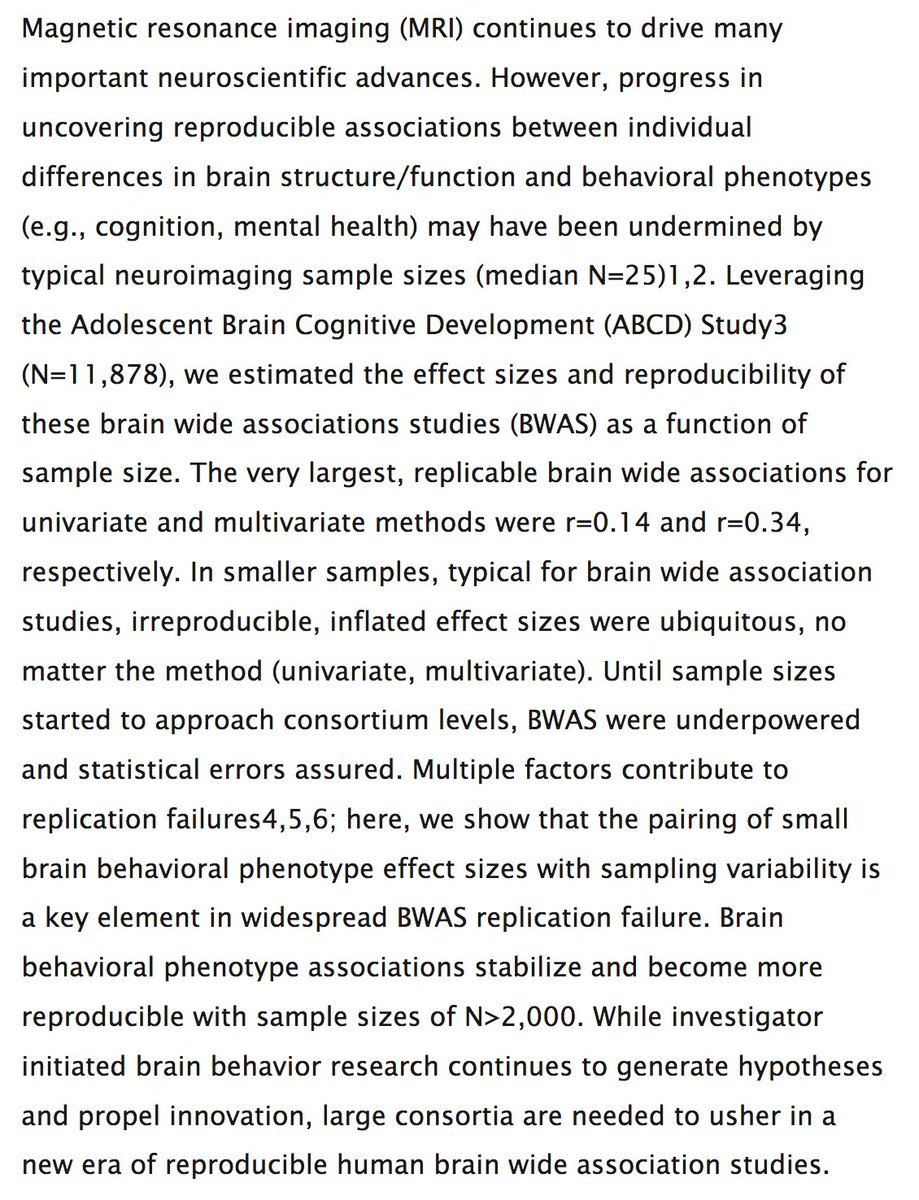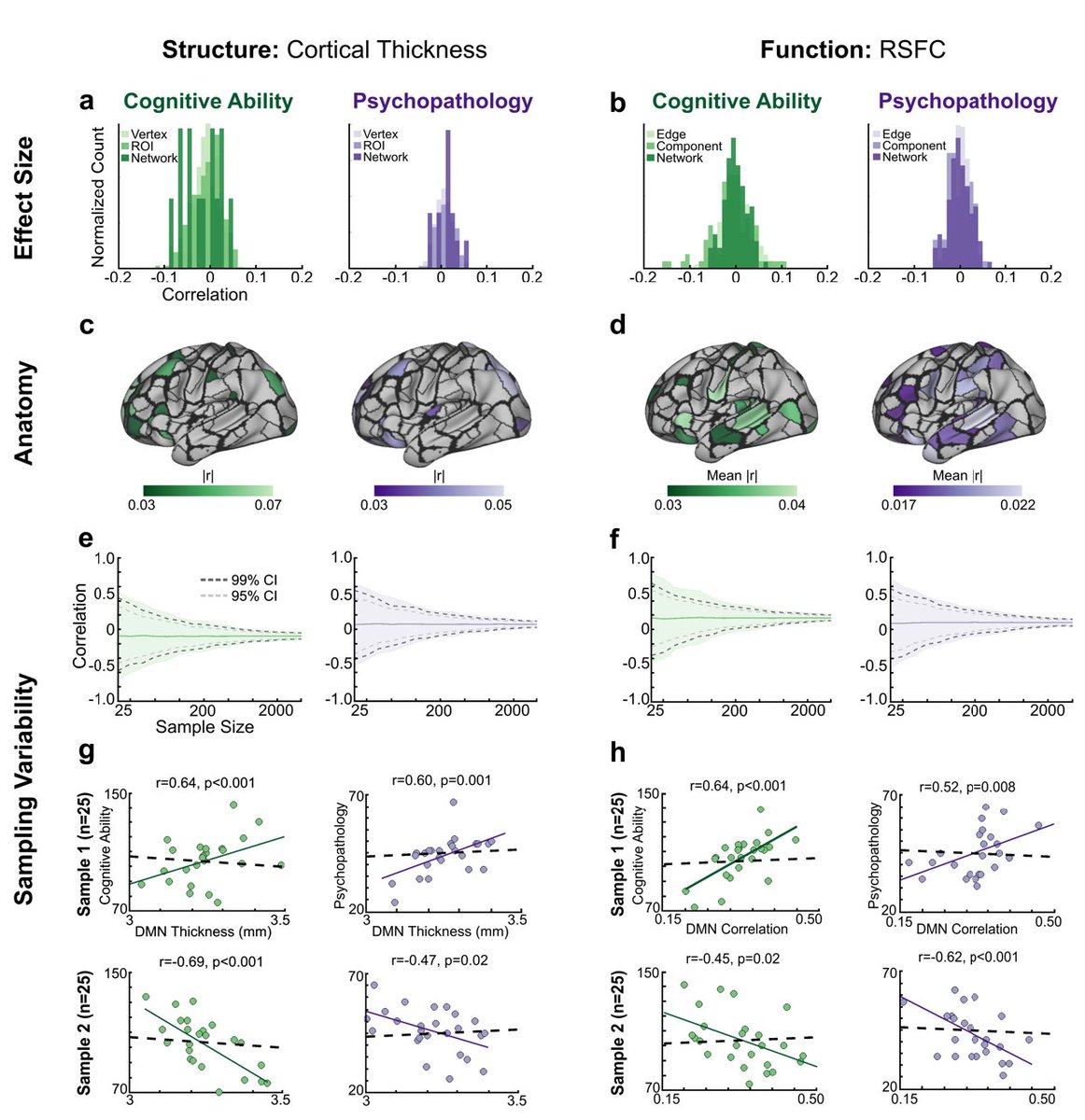Towards Reproducible Brain-Wide Association Studies https://www.biorxiv.org/content/10.1101/2020.08.21.257758v1">https://www.biorxiv.org/content/1... (thread follows... https://abs.twimg.com/emoji/v2/... draggable="false" alt="👇" title="Rückhand Zeigefinger nach unten" aria-label="Emoji: Rückhand Zeigefinger nach unten">)
https://abs.twimg.com/emoji/v2/... draggable="false" alt="👇" title="Rückhand Zeigefinger nach unten" aria-label="Emoji: Rückhand Zeigefinger nach unten">)
This is a really interesting and important paper showing that very large samples are required to get reliable associations between brain imaging and behavioral phenotypes
The starkest conclusion is that the vast sea of literature to date claiming such associations is completely polluted by false positives (not a surprise given they never replicate)
Almost all such studies have simply been vastly underpowered and beset by all the questionable research practices we have come to know and hate, especially publication bias
This clearly mirrors the candidate gene association study literature and the solution the authors explore is the same as for GWAS - collect massive samples through collaborative efforts and perform brain-wide association studies (BWAS)
With samples over 10k, they find robust associations b/w cortical thickness or functional connectivity measures and two behavioral phenotypes: cognitive ability and psychopathology (r ~0.1-0.3)
That& #39;s impressive work, but it& #39;s important to note the very general nature of those two phenotypes which correlate with brain-wide measures, not localised to any region
So, just because you can find correlations for those measures does not mean we should expect a new age of BWAS-driven neurophrenology for more specific behavioral phenotypes
But there& #39;s a stark omission in this paper: why do these studies in the first place? Why should we expect macroscopic imaging parameters to correlate with behavioral differences?
GWAS have a strong and clear motivation: traits are heritable. They are therefore associated with genetic variation overall. We can assay specific genetic variants to see which explain the association.
Even there, there& #39;s the question of what *kind* of genetic variation we can assay - common vs rare - and what kind we think drives the association. But the general premise is well-founded
The premise for BWAS is not even clearly articulated. Why should we expect behaviors to correlate with something like cortical thickness?
Whatever about the simplicity of that hypothesis, is there something like the powerful observation of heritability that provides a foundation for looking more closely in BWAS?
No. There isn& #39;t. The only such data would come from prior brain-behavior correlations and this paper shows the entirety of the prior literature is fatally underpowered. (Apart from general things like brain size and IQ)

 Read on Twitter
Read on Twitter )" title="Towards Reproducible Brain-Wide Association Studies https://www.biorxiv.org/content/1... (thread follows...https://abs.twimg.com/emoji/v2/... draggable="false" alt="👇" title="Rückhand Zeigefinger nach unten" aria-label="Emoji: Rückhand Zeigefinger nach unten">)">
)" title="Towards Reproducible Brain-Wide Association Studies https://www.biorxiv.org/content/1... (thread follows...https://abs.twimg.com/emoji/v2/... draggable="false" alt="👇" title="Rückhand Zeigefinger nach unten" aria-label="Emoji: Rückhand Zeigefinger nach unten">)">
 )" title="Towards Reproducible Brain-Wide Association Studies https://www.biorxiv.org/content/1... (thread follows...https://abs.twimg.com/emoji/v2/... draggable="false" alt="👇" title="Rückhand Zeigefinger nach unten" aria-label="Emoji: Rückhand Zeigefinger nach unten">)">
)" title="Towards Reproducible Brain-Wide Association Studies https://www.biorxiv.org/content/1... (thread follows...https://abs.twimg.com/emoji/v2/... draggable="false" alt="👇" title="Rückhand Zeigefinger nach unten" aria-label="Emoji: Rückhand Zeigefinger nach unten">)">


